Using GHC 7.0.3, I can reproduce your heavy GC behavior:
$ time ./A +RTS -s
%GC time 92.9% (92.9% elapsed)
./A +RTS -s 7.24s user 0.04s system 99% cpu 7.301 total
I spent 10 minutes going through the program. Here's what I did, in order:
- Set GHC's -H flag, increasing limits in the GC
- Check unpacking
- Improve inlining
- Adjust the first generation allocation area
Resulting in a 10 fold speedup, and GC around 45% of time.
In order, using GHC's magic -H flag, we can reduce that runtime quite a bit:
$ time ./A +RTS -s -H
%GC time 74.3% (75.3% elapsed)
./A +RTS -s -H 2.34s user 0.04s system 99% cpu 2.392 total
Not bad!
The UNPACK pragmas on the Tree nodes won't do anything, so remove those.
Inlining update shaves off more runtime:
./A +RTS -s -H 1.84s user 0.04s system 99% cpu 1.883 total
as does inlining height
./A +RTS -s -H 1.74s user 0.03s system 99% cpu 1.777 total
So while it is fast, GC is still dominating -- since we're testing allocation, after all.
One thing we can do is increase the first gen size:
$ time ./A +RTS -s -A200M
%GC time 45.1% (40.5% elapsed)
./A +RTS -s -A200M 0.71s user 0.16s system 99% cpu 0.872 total
And increasing the unfolding threshold, as JohnL suggested, helps a little,
./A +RTS -s -A100M 0.74s user 0.09s system 99% cpu 0.826 total
which is what, 10x faster than we started? Not bad.
Using ghc-gc-tune, you can see runtime as a function of -A and -H,

Interestingly, the best running times use very large -A values, e.g.
$ time ./A +RTS -A500M
./A +RTS -A500M 0.49s user 0.28s system 99% cpu 0.776s
